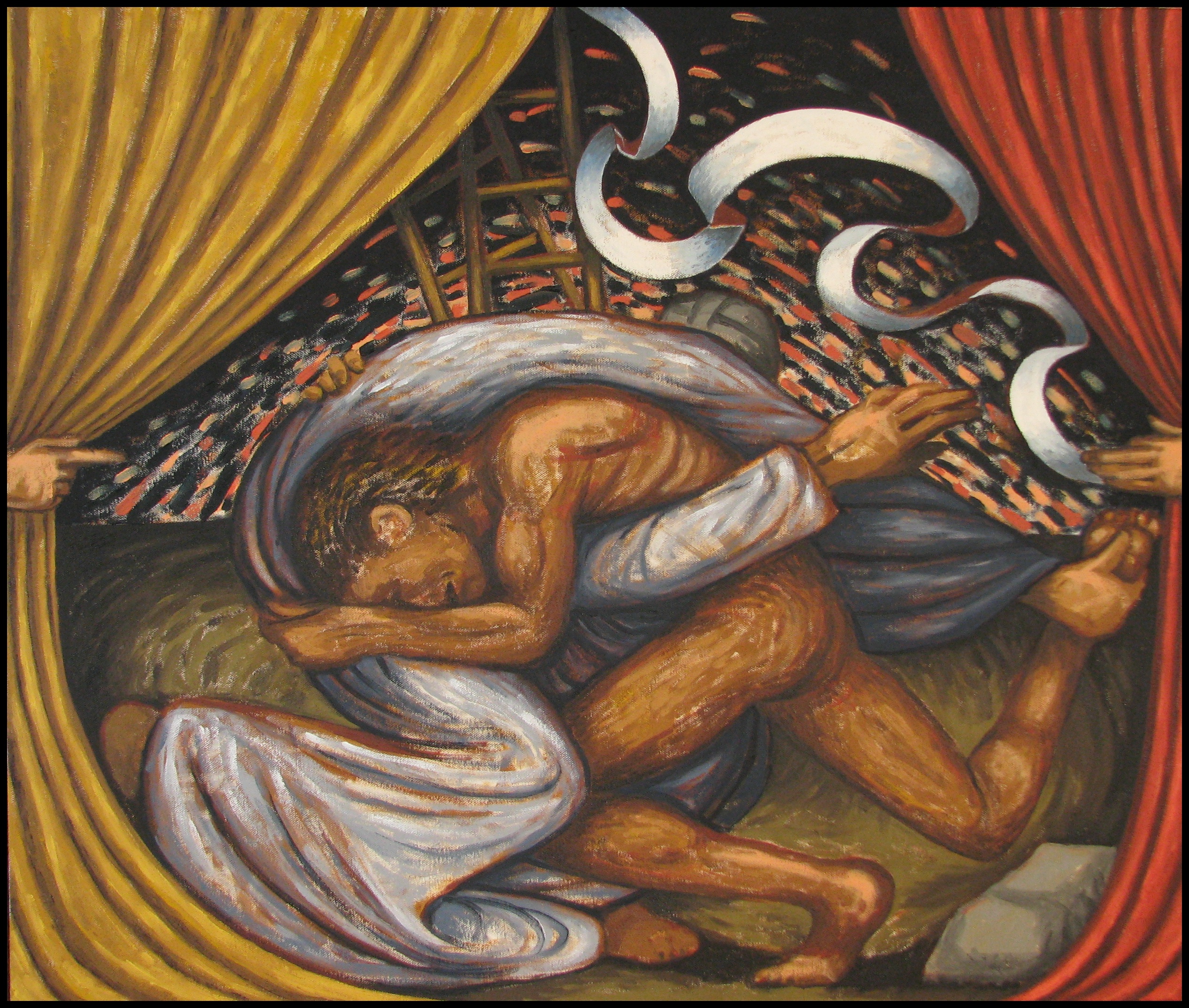In which Manipulation Backfires (in the long run). Not so seeking God’s Blessing! | Dreaming Beneath the Spires
I am reading the story of Jacob in Genesis. God tells Rebecca who was pregnant with twins, “The older will serve the younger.”
When we meet the twins in Genesis 26, Esau, “a skilful hunter,” comes in famished, and wants Jacob’s red stew. Jacob, “a quiet man, staying among the tents,” driving an exploitative bargain, demands Esau’s birthright, traditionally a double portion of the inheritance, in exchange for the bowl of lentil stew.
Isaac was “very wealthy. He had many flocks and herds and servants.” (Gen 27:25). So Esau is asked to give his extra third of all this to Jacob for a bowl of aromatic stew. In his impulsivity, he agrees.
* * *
A cruel bargain, but not a deceitful one. What is cruel and deceitful is how Jacob later takes advantage of blind Isaac, and pretends to be Esau to steal his blessing, wearing Esau’s clothes, passing off choice young goats from their flock, skilfully prepared by Rebecca, as game caught and cooked by Esau.
And despite his misgivings, “Your voice is the voice of Jacob,” Isaac blesses Jacob with the blessing he had intended for Esau
“May God gives you of heaven’s dew,
and of earth’s richness—
An abundance of grain and new wine.
Be Lord over your brothers
And may the sons of your mother bow down to you.”
Jacob no sooner leaves than Esau enters, with game he had killed himself, tastily prepared.
“Isaac trembled violently, “Your brother came deceitfully, and took your blessing. I blessed him and indeed he will be blessed.”
Esau “burst out with a loud and bitter cry,” ‘Bless me—me too, my father. Do you have only one blessing, my father? Bless me too my father.’ And Esau wept aloud.”
His father answered him
“Your dwelling will be away from the earth’s riches
And you will serve your brother
But when you grow restless,
You will throw his yoke from off your neck.”
* * *
And then what happened?
* * *
God did not allow this trickery to prosper.
Blessing comes from God. Parental blessings are only prayers to God to bless children. As such, there is power in them. But not magic. If our blessings of our children determined their destinies, the world would be full of Einsteins, Leonardos, Shakespeares, Michael Phelps and Bill Gates.
Furious at his deceit, Esau plans to kill Jacob, and Jacob flees, living in exile for 20 years, as a hired man, serving Laban.
Esau, meanwhile, built up his own wealth, staying home as a rich man’s son. “I have plenty, my brother,” he tells the returning Jacob (Gen 33:9).
And Esau uses family wealth for the bride price of his three wives, whereas Jacob worked as a hired man for fourteen years for his two wives, one of whom he did not love or want.
“Be Lord over your brother and may the sons of your mother bow down to you,” was the blessing Isaac meant to give Esau, and Jacob “stole.”
However, when he returns, it is Jacob who bows to Esau and calls him Lord–always the blessing Isaac had intended for Esau.
“Jacob bowed down to the ground seven times as he approached Esau.” (Gen 33:3). He introduces his children, “They are the children God has graciously given your servant.”
He sends Esau a gift of “two hundred female goats, and twenty male goats, two hundred eyes and twenty rams, thirty female camels with their young, forty cows and ten bulls, and twenty female donkeys and ten male donkeys.” The servants are to say, “They belong to your servant Jacob and are a gift sent to my Lord, Esau.”
Jacob insists, “Please accept the present that was brought to you. They are to find favour in your eyes, my Lord.” (The Hebrew word berakah means both blessing and gift or present.) “And because Jacob insisted, Esau accepted.”
So, in a sense, Jacob returns the stolen blessing and birth-right and Jacob now bows to Esau, and the wealth he has gained goes to serve his brother, which were the blessings Isaac had intended for Esau.
And Jacob gets the blessing/curse that Isaac sadly gave Esau. “Your dwelling will be away from the earth’s riches ( he was a hired man for twenty years). And you will serve your brother (which he does with his massive gift). But when you grow restless, you will throw his yoke from off your neck,” as Jacob does by refusing to follow Esau to Seir but instead settling in Succoth and later in Hebron.
* * *
What were the result of Jacob’s attempts to manipulate Esau’s birthright and blessing away from him?
He had to run away from his home. He never saw his mother again. Deceived, he worked seven years for an older daughter he did not love or want, and another seven years for the beautiful daughter he did. He worked for 20 years as a hired man, frequently cheated (Gen 30:35-36; Gen 31:7). He gave a good portion of his wealth to Esau.
God did not allow his trickery to prosper. Esau got the blessing Isaac mistakenly gave Jacob. He gets earth’s richness and abundance; Jacob bows down to him and calls him Lord. Jacob gets the “blessing” Isaac sadly gave Esau—he lives away from the richness of Canaan for 20 years, his labour serves his brother, and he eventually shakes him off.
* * *
However, just before meeting Esau again, Jacob is blessed by God in a dramatic encounter by the Jabbok River which left him limping and in no doubt that blessing comes from God, not from our intrigues, manipulations or even hard work.
And he enters Canaan, the land of blessing, once he is “broken.” He now limps, leaning on Him who had always intended to bless him, and would have done so far more rapidly, had Jacob not tried to help him out with his own manipulations.
And from that second blessing, the blessing of God, not the stolen one, all subsequent goodness in his life would flow.
* * *






